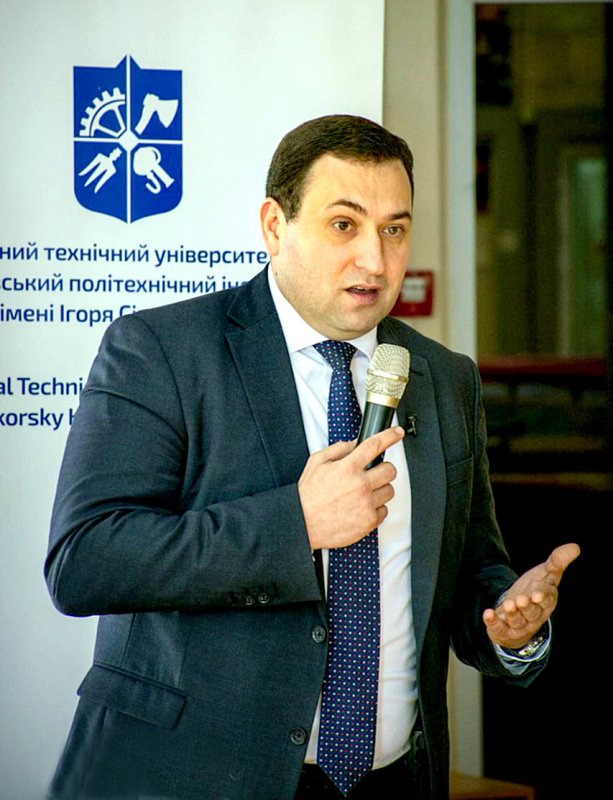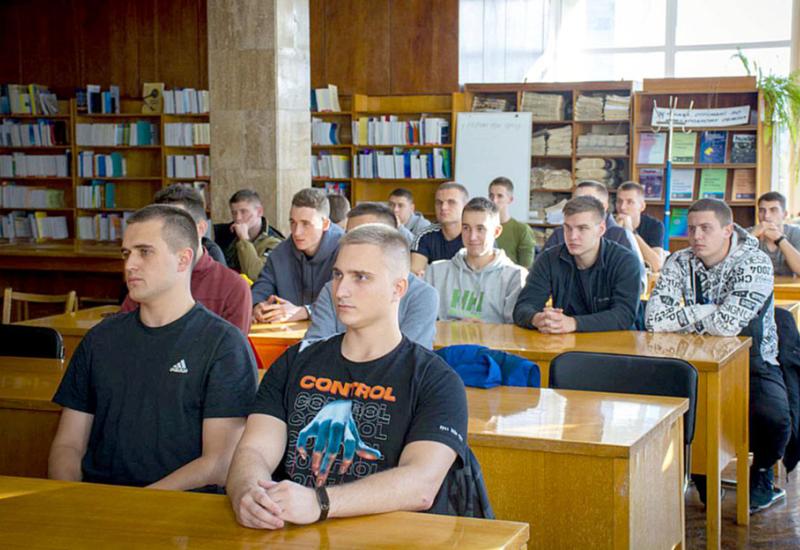In a conversation with Yevheniia Kulyk, Deputy Director of the H.I.Denysenko Scientific and Technical Library of Igor Sikorsky Kyiv Polytechnic Institute, a correspondent of Kyiv Polytechnic discussed a set of events that took place at the university on the occasion of the International Day of Academic Integrity in October.
- Yevheniia Volodymyrivna, at the end of October, Igor Sikorsky Kyiv Polytechnic Institute, with the support of the Ministry of Education and Science of Ukraine, held an all-Ukrainian round table "Academic Integrity: Experience, Practices, Challenges, Progress". Later, a series of open lectures "Academic Integrity: Rules of the Game or a Matter of Honor" were held in the KPI Library for several weeks. They were held in a mixed format. Please share your impressions of these events.
- My impressions are certainly pleasant, since for a long period of time, due to the COVID-19 pandemic and later the full-scale Russian-Ukrainian war, events aimed at promoting academic integrity were held remotely. This year, we have returned to bringing the community together to discuss various aspects of academic integrity directly in the library's reading rooms.
Let me remind you that since 2016, Igor Sikorsky Kyiv Polytechnic Institute has had a working group on academic integrity, which includes heads of university departments, teachers, students, and library representatives. Every year, we develop a plan of activities aimed at creating a high level of academic integrity culture: from developing or updating internal regulatory documents to creating comics and videos. This comprehensive approach helps to unite the academic community to discuss challenges in implementing academic integrity policies and procedures in the educational process. Today, we are mainly focused on developing skills and abilities that allow us not to unwittingly violate the principles of academic integrity on a daily basis in the educational process and research activities. This can be seen in the topics of the open lectures that took place.

Anatolii Melnychenko, Vice-Rector for Academic Affairs of Igor Sikorsky Kyiv Polytechnic Institute, started the course with an open lecture "Academic Integrity: the most important thing from theory for practical results". Olena Kosmina, Head of the Department of Information Support for Education and Research of our library, spoke about responsible search and fair use of information sources. The director of our library, Oksana Brui, spoke about open science as a means of promoting academic integrity, and my presentation was on the topic "Who can conclude whether a paper contains plagiarism: all about checking academic texts." Together with Tetiana Nizhynska, head of the library's sector, we also gave a lecture on the conditions for borrowing from other scientific sources. I think our audience will benefit from the knowledge gained during the lectures.
By the way, the video from the round table "Academic Integrity: Experience, Practices, Challenges, Progress" is available on the YouTube channel of Igor Sikorsky Kyiv Polytechnic Institute https://www.youtube.com/watch?v=SuFYaig3BVk.
- The next question is appropriate on the eve of the winter session. After all, simultaneously with it, qualification, master's and diploma theses will be checked for plagiarism. Which academic texts are subject to mandatory checks for signs of appropriation or borrowing from another's scientific or literary work without the author's permission and without indicating the source?
- Students' term papers, qualification papers for the bachelor's or master's degree, dissertations for the doctoral degree of Doctor of Philosophy/Doctor of Arts (PhD) or Doctor of Science, manuscripts of monographs and textbooks are subject to mandatory verification, that are recommended for publication by the Academic Council of the University, manuscripts of textbooks that have the author's text and are recommended for publication by the Methodological Council of the University, manuscripts of articles, abstracts of responses submitted to the editors of scientific journals or organizing committees of conferences, seminars, etc.
- How is the process of checking academic texts organized?
- The university's account in the online system for detecting matches/identity/similarity is administered by a responsible employee of the Scientific and Technical Library of Igor Sikorsky Kyiv Polytechnic Institute. Each department has appointed responsible persons who carry out technical verification of course and qualification works. At the request of the responsible persons, the administrator creates accounts in the online system and provides the required number of pages for review. On average, 70 pages are provided for one bachelor's thesis and 100 pages for one master's thesis.
- How is the process of checking academic texts organized?
- The university's account in the online system for detecting matches/identity/similarity is administered by a responsible employee of the Scientific and Technical Library of Igor Sikorsky Kyiv Polytechnic Institute. Each department has appointed responsible persons who carry out technical verification of course and qualification works. At the request of the responsible persons, the administrator creates accounts in the online system and provides the required number of pages for review. On average, 70 pages are provided for one bachelor's thesis and 100 pages for one master's thesis.
Also, responsible persons for the technical review of manuscripts are appointed in the editorial offices of the university's scientific periodicals and conference organizing committees. It is the administrator who advises the responsible persons through communication channels convenient for them, monitors and informs them about interesting online educational events that are worth joining, as well as about changes in regulations on academic integrity, sends official recommendations, etc.
The responsible library officer carries out technical verification in the online system of manuscripts of monographs and textbooks, manuals that have the author's text and are recommended for publication by the Methodological Council of Igor Sikorsky Kyiv Polytechnic Institute.
- What are your wishes to the readers of "Kyiv Polytechnic"?
- It is important to continue to form a high level of academic integrity culture as a single integrated process in the future. The more teachers, students, and researchers join in, the better results we will get. I would like to emphasize that in addition to the academic integrity module taught to all first-year students, the university-wide elective course "Fundamentals of Academic Integrity" offered to second-year students, all teachers, supervisors, and advisors can contribute to the promotion of six fundamental values: honesty, trust, justice, respect, responsibility, and courage.
Let me remind you that providing advice and conducting educational activities on various aspects of information literacy and academic integrity, including finding and accessing quality educational and information sources, citing and referencing in accordance with national and international requirements, choosing a publication to publish research results, using text matching/identity/similarity detection systems is not a complete list of the daily duties of my librarian colleagues, who thus contribute to the process of forming a culture of academic integrity in society.
The KPI Library is always here for you, so please contact us and we will help!

